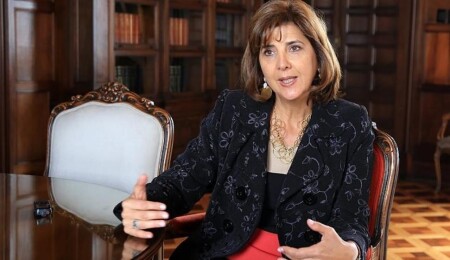Holguin: Federal Solution No Longer a Common Point of Reference

A bizonal, bicommunal, federal solution to the Cyprus problem is no longer a “common point of reference” for the island’s two sides, United Nations envoy Maria Angela Holguin said on Tuesday.

Speaking to newspaper Politis, she said the solution model “remains the framework adopted by the UN”, but that the lack of agreement between the island’s two sides over the matter is “one of the consequences of the failure at Crans Montana”.
“Four years after the informal 5+1 conference in 2021, the two sides’ positions remain very far from one another. That reality must be taken into account, because as it is known, it takes two to tango,” she said.
She added that it is “equally worrying” that there is a “growing gap” between the island’s two communities “at a social level” but stressed her determination to close that gap.
“I am determined to help the sides to move forward step by step to locate those accepted elements which will contribute to building confidence and to finding common ground for the future. That is the priority which the UN secretary-general [Antonio Guterres] has set for my mission at this moment,” she said.
Asked whether it is possible, after decades of failures, for Cypriots to feel optimism regarding the search for a solution to the Cyprus problem, she stressed that “all of those decades of attempts on the part of the UN were not lost”.
“The UN remains deeply invested in contributing to peace and to stability in Cyprus, through the presence of its peacekeeping force [Unficyp] and through its attempts to promote dialogue between leaders. These attempts are fundamental, because no country can remain divided in the 21st century,” she said.
On the matter of Unficyp, she said its presence “cannot indefinitely replace negotiations”, before offering her sympathy to Cypriots disaffected by the lack of progress towards a solution.
“I understand completely why many Cypriots feel disappointed. I must say that that sentiment is shared by many regional and international players who invested and who continue to invest time, effort, and political capital with the aim of helping Cypriots to find a sustainable and lasting solution,” she said.
“If the leaders realise that a solution is in everyone’s interest, then they will find a way.”
She then stressed that “where there is a will, there is a way”, and said Guterres has “made repeated calls on the two leaders to find a realistic route towards a reunited Cyprus”.
She pointed out that her visit to Cyprus comes at a time of “great uncertainty for the wider region”, and that this is “something that all Cypriots understand, given the island’s geopolitical position”.
“Inside that worsening regional environment, the work performed by the Turkish Cypriot and Greek Cypriot leaders from the informal meeting in Geneva offers a ray of hope,” she said, adding that next week’s meeting in New York will “constitute an important opportunity to evaluate the progress made” since the meeting in Geneva in March.
Additionally, she said, it will allow all sides to “deal with the remaining obstacles and to find a new, even more ambitious agenda to the coming period”.
“At the end of the day, what really matters is improving the lives of people through the application of agreed-upon measures. That is the best evidence that dialogue between the leaders can produce tangible results for the benefit of everyone,” she said.
“It is a prerequisite for the most difficult job: bridging the gap between the positions of the two sides with the aim of finally succeeding in finding a lasting solution to the Cyprus problem”.
With this in mind, she said that should the confidence-building measures agreed upon in Geneva “bring about tangible benefits for both communities”, this could “open the way and build the belief that change is possible and that a sustainable and lasting solution can be found”.
She was then asked about the matter of property in light of recent arrests made by the Republic of Cyprus of people accused of people accused of selling Greek Cypriot-owned property in the north and stressed that “the matter of property was always a basic component of previous rounds of negotiations”.
“This issue deeply touches many people from both sides for obvious and completely understandable reasons. The continued developments around this important issue constitute yet another reminder of the negative consequences of the absence of official negotiations for a solution,” she said.
“I would also like to point out that this matter can only be dealt with through complete political discussions at the leadership level. Unfortunately, there are no easy ways out for the resolution of this complex and critical issue.”
The next enlarged meeting on the Cyprus problem is set to take place in New York next week, with President Nikos Christodoulides and Turkish Cypriot leader Ersin Tatar set to be joined by Guterres and representatives of Cyprus’ three guarantor powers, Greece, Turkey, and the United Kingdom for a two-day conference beginning on July 16.
Two days prior, UN special representative in Cyprus Colin Stewart will brief the security council on the Cyprus problem.
Source: Cyprus Mail


Comments
Attention!
Sending all kinds of financial, legal, criminal, administrative responsibility content arising from illegal, threatening, disturbing, insulting and abusive, humiliating, humiliating, vulgar, obscene, immoral, damaging personal rights or similar content. It belongs to the Member / Members.